

What will it be like when the night lights of the paper mill in Canton go dark?
What will it be like when the smoke stops billowing out of the stacks?


What will it be like when the whistle blows for the last time?
On March 6, 2023, in an earnings report, Pactiv Evergreen announced it would close its paper mill in Canton by the end of June. The company is owned by a billionaire in New Zealand, and it was publicly listed on the NASDAQ in September 2020.
The company is on “solid footing,” reporting an increase in net income for 2022 of $286 million. In the report, the company said, “We assess all changes to the business with considerable thought for our employees, customers, shareholders and communities, and do not take these decisions lightly. We remain committed to doing what’s right, treating everyone with respect, and delivering on all of our commitments to our people, customers, shareholders and the communities where we operate.”
Everyone I talked to in Haywood County remembers where they heard the news.
It came as a surprise nothing short of heartbreaking.
The assistant superintendent of Haywood County Schools, Jill Barker, was at a soccer game. She said word trickled through the crowd, and by the end of the game, those in the stands were in tears, but not because of the outcome of the game. She texted the news to Superintendent Trevor Putnam.


“Even through the flood and everything, people always assumed the mill would be open,” Mason Keener, an 11th grader at Haywood Early College, told me.
The night of March 6, Keener overheard his parents talking. His dad has worked almost every job at the mill, Keener said.
Keener talked about the initial shock of the news and the stress of it since then. He talked about how his family is looking for other job opportunities “like mad,” but that’s held in check by the need for his dad to work until the mill closes to get the severance package being offered.
“It’s the lifeblood of Canton. It’s like losing this huge part of the town I grew up in,” said Keener. “The mill is what made Canton.”
In addition to his dad, Keener’s grandfather worked at the mill. His great-uncle, he said, still works there. All of his mom’s extended family worked there at one point or another.
“It’s really sad to see it go,” he said.
This community has been through too much. On top of the pandemic, the school district had a ransomware attack on August 24, 2020; Tropical Depression Fred brought mudslides and historic flooding to the county on August 17, 2021; and now the mill is closing.
“People just keep getting knocked down. And they stand back up,” said Lori Fox, the principal at Haywood Early College. “And they get knocked down, and they stand back up.”


The leaders of the town and the county, the school district and the community college are at the very beginning of a long process that will turn the closing of the mill into an opportunity, not just for Canton but for all of North Carolina.
The Mill Town Strong website and Facebook page provide resources and information on what’s happening in Canton, including about the WARN notice (Worker Adjustment Retraining Notification) that has yet to be filed.
EdNC will be on the ground through the end of the school year and beyond, documenting how leaders and the community are assessing needs and addressing the challenges and opportunities in the days and months ahead.
The history of the mill
Construction of what was then Champion Fibre Company started in 1906. According to the Forest History Society, “The location was chosen due to the large supply of timber for pulp fiber, access to water, and rail access to promising markets.”


In 1907, the N.C. General Assembly enacted chapter 298, “An Act to Encourage the Building of Pulp Mills and Paper-mills and Tanneries in the Counties of Haywood and Swain.”


Production started in January 1908, 115 years ago.


According to the U.S. Census Bureau, the population of Canton grew from 230 in 1900 to 1,393 in 1910.
Four generations of mill workers have called Canton home since then.
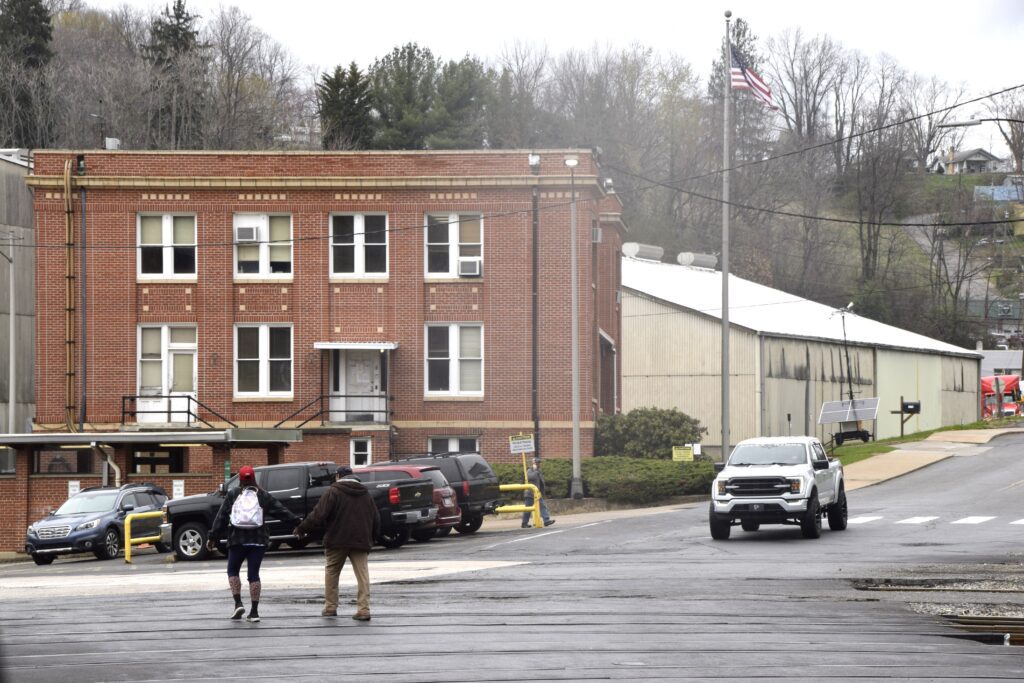

According to human resources at Pactiv Evergreen, these are the zip codes of the 1,112 current mill workers:


Throughout all of the ownership transitions — including from Champion Fibre Company to Champion Paper and Fibre Company to U.S. Plywood–Champion Papers to Champion International Corporation to Blue Ridge Paper, Inc. to Evergreen Packaging to Pactiv Evergreen — the Canton mill has remained in operation except when it floods.
The lay of the land in Haywood County
Haywood County is 30 minutes west of Asheville and four hours west of Raleigh.
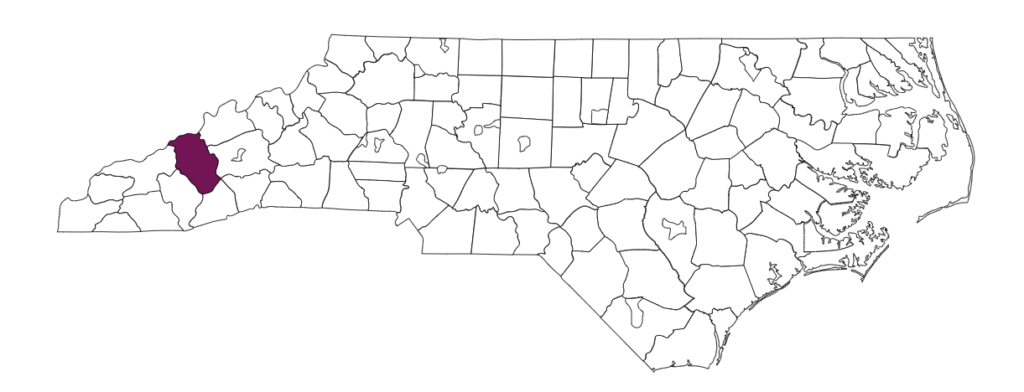

The mill sits on 185 acres on Main Street in the town of Canton. You can drive all the way around the site and see the wood chips piled up and waste water treatment clarifiers in addition to the smokestacks.
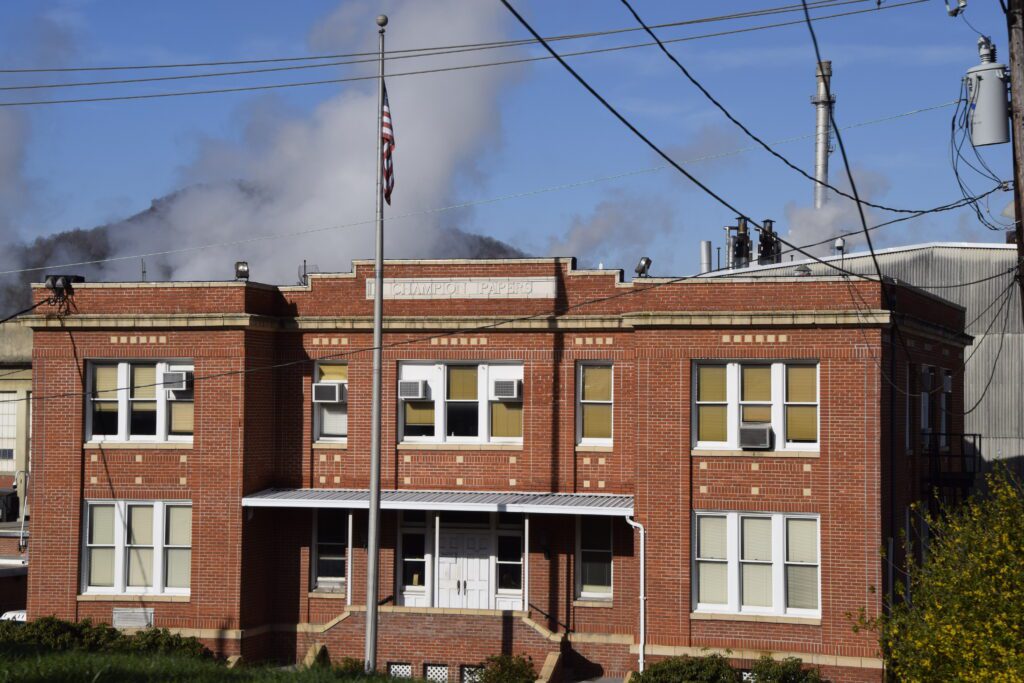



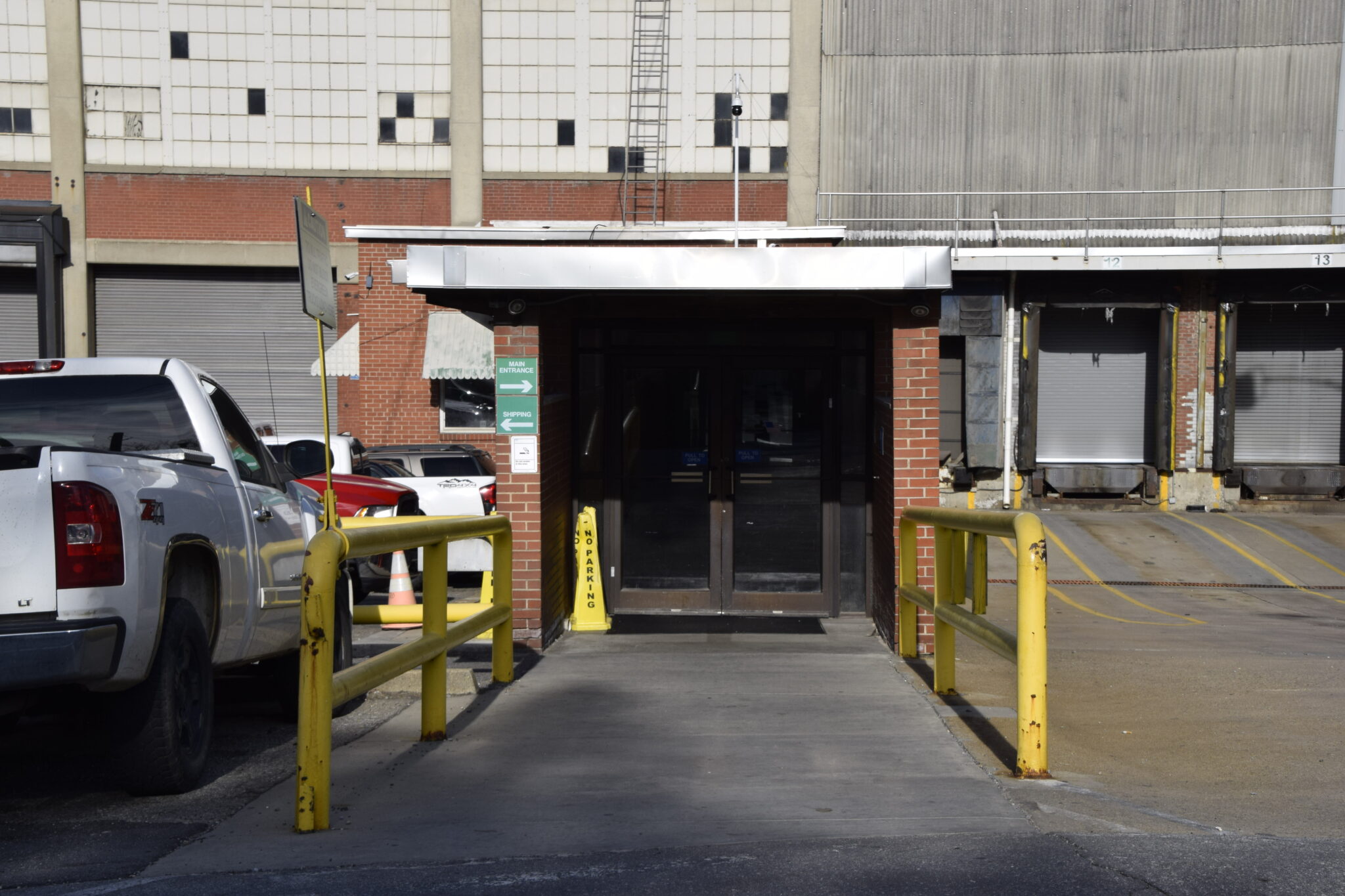



The Pigeon River runs north through the mill and the town. The mill treats waste water for the town, which it will continue to do by contract for two years.








For more information about the pollution of the river, water quality, and environmental lawsuits, this article by the Smoky Mountain News is worth a read.
About 10 miles away is the Pactiv Evergreen mill in Waynesville, which locals call “Little Champion.” According to the earnings release, “The Company also continues to explore strategic alternatives for its … Waynesville, North Carolina facility.”
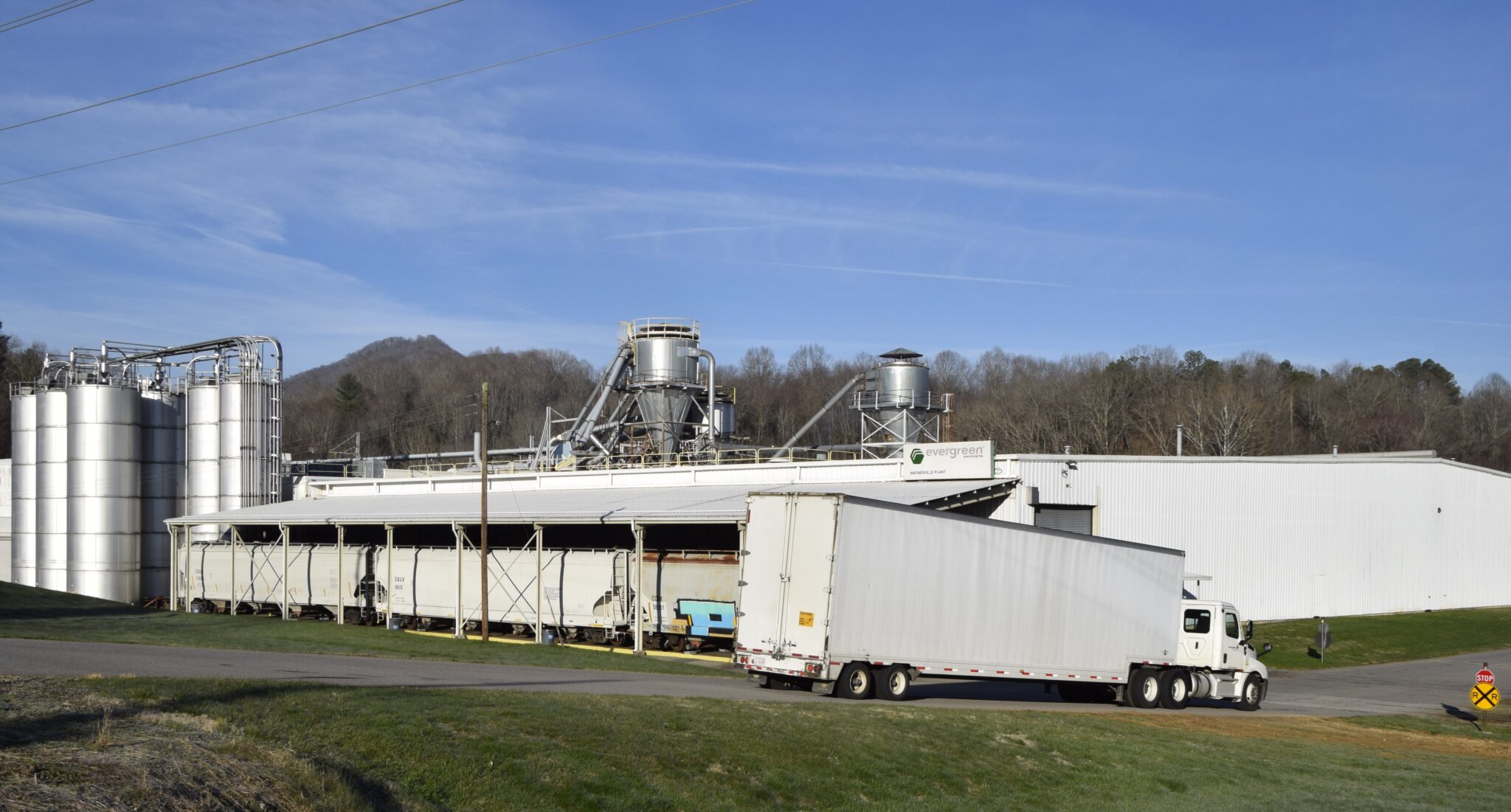

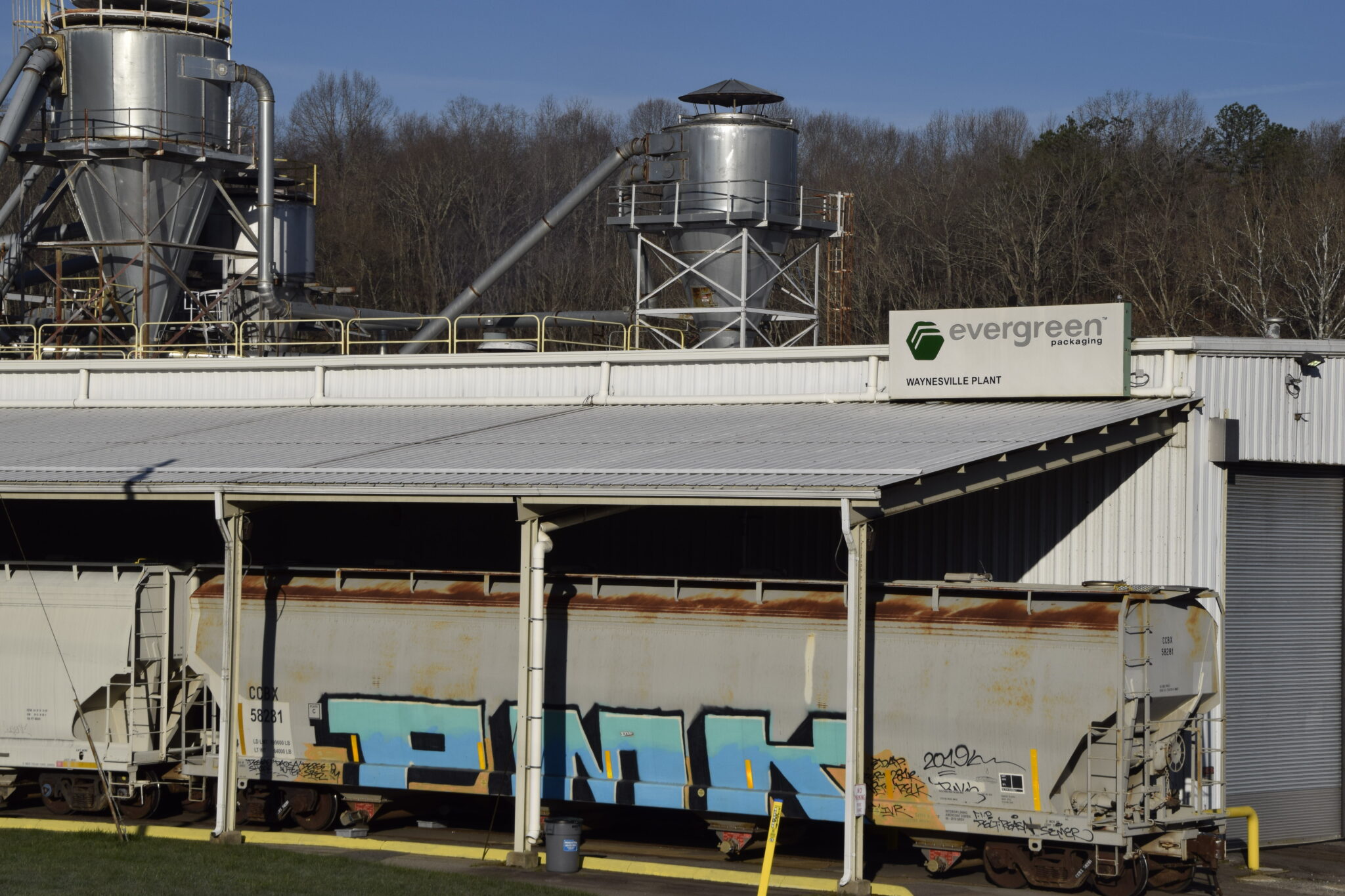



In 1905, the company started operating a model logging village in Sunburst, 12 miles from Canton.


In 1932, a dam was built at Sunburst to flood what is now Lake Logan. You can still see the old air strip where company executives would fly in. According to a monument, the company owned 4,800 acres in this part of the county.








The most significant mudslide in the 2021 flooding happened about 15 miles upriver from the mill on the west fork of the Pigeon River near Laurel Bank Campgroup in Cruso, according to a report by Haywood County Emergency Services. The communities along Highway 276 are still recovering.








In 1932, employees of Champion Paper Fibre Company created Champion Savings and Loan, known today as Champion Credit Union and still headquartered in Canton. According to WLOS, the credit union is putting up $150,000 for relief for members who are workers at the mill. Here is more information on how to apply.
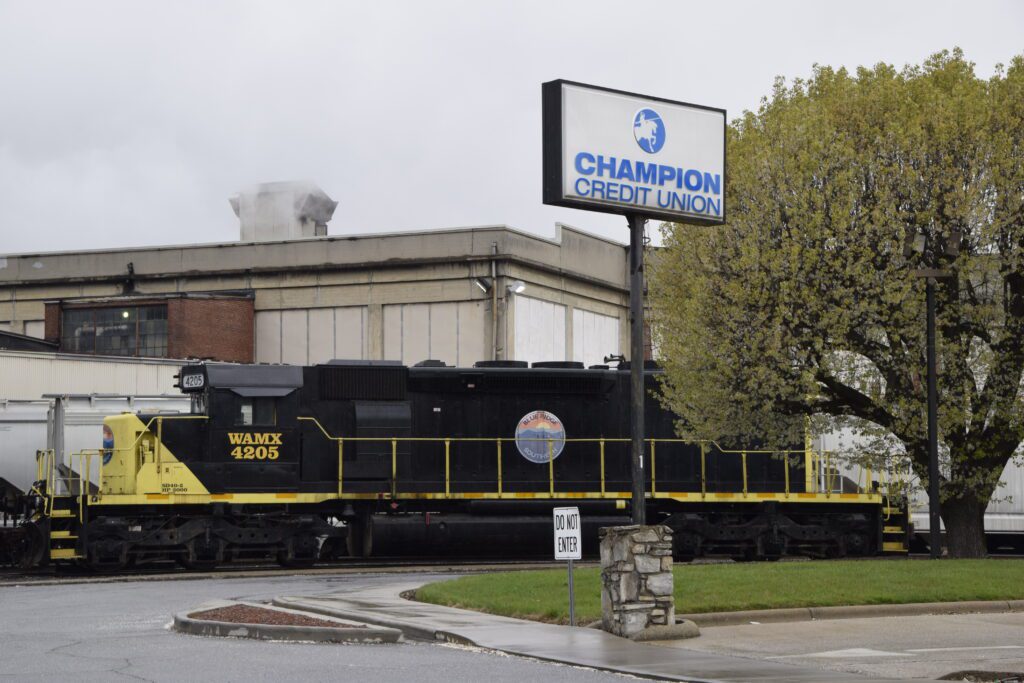

The coffee shop at 119 Main Street in Canton is called Papertown Coffee, and this mural in town documents the role of the mill in the past and present.


Assessing needs, challenges, and opportunities
According to data from the N.C. Department of Commerce, Pactiv Evergreen is the largest employer in Haywood County.
Haywood County Schools is currently the second largest employer.
Leaders from the town and the county, the school district and the community college are working together to secure resources from the federal, state, and local government along with private philanthropy to shape the future of the county, the region, and our state.
Canton is a mill town that truly loves being a mill town.
And so, in addition to reimagining that collective identity, leaders worry about helping families find jobs that will allow them to stay in the county, the ripple effects on suppliers to the mill, the impact on the railyards regionally, the loss of tax revenue, site remediation, and the transition of the responsibility for waste water treatment.
Even now, you can also see the beginnings of scenario planning for the future taking hold in their minds.
Gov. Roy Cooper’s budget released on March 15 provided an early boost of support, including at least $5 million in a fund that could increase with additional funding from the federal government, the legislature, and private philanthropy.
“I’m deeply concerned for people in Canton,” said Cooper at the budget press conference. “We understand that this is a big blow to the people of western North Carolina across the board. We got to work to fix it.”
According to the Associated Press, Gov. Cooper and Attorney General Josh Stein have requested that the $12 million in incentives to keep the mill in operation through 2024 be returned by Pactiv Evergreen.
All of that is just the beginning of what this community will need moving forward.
Haywood County Schools


Superintendent Trevor Putnam knows his schools. His first day as superintendent was Nov. 1, 2022, but for the previous 26 years he served as teacher, coach, assistant principal, principal, and associate superintendent in elementary, middle, and high schools, as well as the central office.
His district is among the top 10 in North Carolina, with the seventh highest combined test results in 2021-22.
Haywood County Schools has 15 schools: eight elementary schools, three middle schools, three high schools, and an early college.


There are no low performing schools, and Haywood Early College — an Apple Distinguished School — is among the very best in North Carolina.
This district is just 1.1% off its combined test scores compared to the year prior to the pandemic.
With a triple-hit to average daily membership (ADM) from the pandemic, the flooding, and now the potential loss of students as families consider relocating, the district will need support to sustain this high level of academic performance.
As the future largest employer in the county, the superintendent will need a seat at the table with the leaders who are reimagining the future of the county’s workforce.
The school district needs help getting $1.6 million in revenue released from FEMA for the flood. “It’s strapping our budget right now,” said Putnam of the dollars he has fronted.
An extension from the U.S. Department of Education — which would have to be submitted by the N.C. Department of Public Instruction (DPI) — may be needed on the spending of ESSER dollars. Most extensions are 18 months, but this district may qualify for an even longer extension given the “extraordinary circumstances.”
The district may need the flexibility afforded by North Carolina’s renewal school district.
It may need a hold harmless on ADM so it can assess how best to serve its students and families moving forward. Month 1 ADM has declined from 7,093 in 2019 to 6,472 in 2022, and the district is not eligible for the small schools or low-wealth allotments from the state.
“Our families are living in a crisis moment,” said Clint Conner, the principal at Pisgah High School. “They don’t know what to expect moving forward.”
On March 21-22, the district will hold a resume writing workshop for employees of Pactiv Evergreen. You can find more information here.
And while supporting the families is the priority for the district’s leaders, Conner said this is also the time of year they are working on the master schedule for the next academic year, assigning teachers to sections.
“If we lose five teachers because of a drop in enrollment,” Conner said, “that would be a drop back and punt situation.” That means principals could be scrambling to rework the master schedules through the start of school in August.
As property around the county changes ownership because of the mill closing, opportunities for infrastructure investments may emerge for the district. A request for a new middle school had been submitted before the mill closure was announced. Here is when the schools in the district were built and renovated, according to the facility needs assessment in 2020 by the N.C. Department of Public Instruction:
Bethel Elementary: 2007
Clyde Elementary: 1999, 2008
Hazelwood Elementary: 1999, 2007
Johnathan Valley Elementary: 1986, 1996, 1997
Junaluska Elementary: 1974
Meadowbrook Elementary: 1986
North Canton Elementary: 1967, 1975, 1985, 1996, 2008
Riverbend Elementary: 1998, 2008
Bethel Middle: 1953, 1976, 1986, 1999
Canton Middle: 1934, 1954, 1976, 2002
Waynesville Middle: 1930, 1953, 1984, 1998, 2006
Central Haywood High: 1942, 1960, 1970, 1997
Pisgah High: 1938, 1966, 1970,2008
Tuscola High: 1966, 1970, 1985, 2008
You can see the last significant renovations to the district’s real estate portfolio occurred 15 years ago.
The district will need additional resources to support the mental health of students. Even before the news of the mill closing, Pisgah High School had conducted 28 suicide assessments since January.


“That’s the part that worries me,” said the superintendent. “People need hope.”
So does this district.
Here you can donate to the Haywood County Schools Foundation.
Haywood Community College
Shelley White has been the president of Haywood Community College (HCC) since Jan. 1, 2020, but she has lived in Canton for 19 years.
HCC has an annual economic impact of $64.8 million, including $14.5 million in operations spending, $3.4 million in student spending, and $46.9 million in alumni impact, according to a study paid for in part by the N.C. General Assembly.
Locally, HCC trains the early child care workforce, operates an early child care center, trains first responders, supports the mental health of those at the college and in the community, trains the health care workforce, creates opportunities through the nationally regarded early college located on its campus, provides opportunities for other high school students to experience college, imagines the future of work, provides local leadership, and now in the face of the mill closing, it will be needed to do even more.
Here are some immediate supports for students according to HCC and The Hunt Institute, including information on FAFSA reviews when students’ circumstances change and Finish Line Grants:
HCC needs an investment of $6 million from the N.C. General Assembly and/or the federal government to expedite upgrades of the Regional High Tech Center located at 112 Industrial Drive in Waynesville to prepare individuals for high-demand infrastructure and construction fields including energy, communication, transportation, and construction industries.
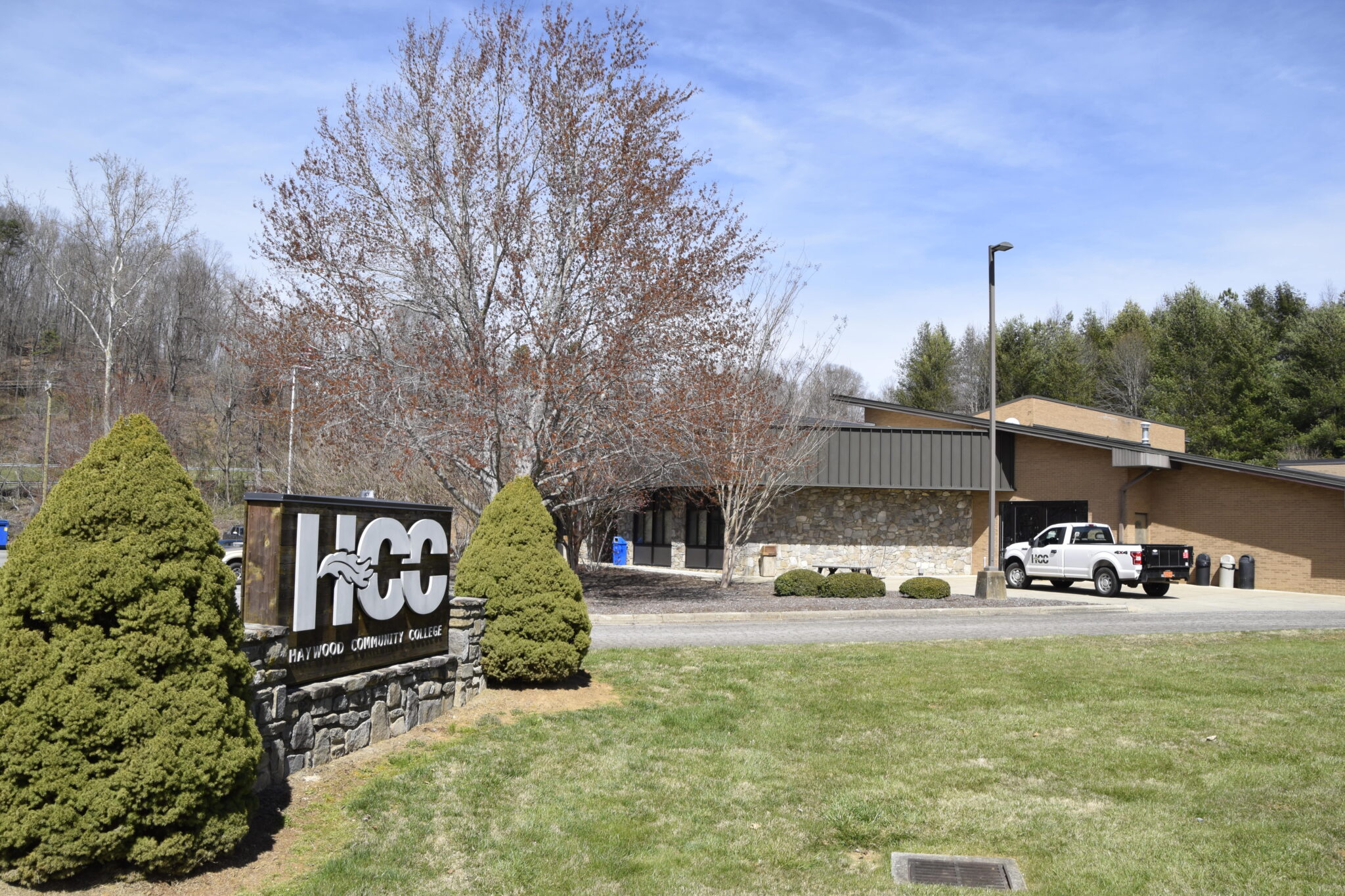



Funding will be used to begin programs for electrical lineworkers, truck driving, and broadband technicians. Each of these programs will provide short-term training that will lead to jobs that are in high demand and provide a solid career, all while supporting the local community, according to a press release.
In 1986, HCC opened the regional center. According to the community college, it was the first advanced technology center of its kind in the state of North Carolina, and it remains a state-of-the-art education and training center for advanced metal forming, machining, including 5-axis contours, computer-aided design (CAD), manufacturing, and engineering.
In 2019, HCC acquired the adjacent building on the property and opened the Advanced Manufacturing Incubator.
For what will become the Workforce & Industry Center, the $6 million in renovations will include HVAC system replacement, a plumbing system upgrade, all finishes, a layout reconfiguration to meet current needs, replacement of the roof, new insulation, new data networking and technology, and remodeling the restroom for accessibility.
The remaining renovation to the adjacent building includes a partial HVAC replacement, insulation, all finishes, additional restroom facilities, and a new roof.


But HCC will need more from the state than an investment in the center.
A 2004 case study of a mill closing in North Carolina found our community colleges take on a “disproportionate share of the impact of laid off workers seeking training” and that the lag built into state funding formulas doesn’t work.
The impact of long-term underfunding is exacerbated when you have one crisis, much less three.
The student investment being requested by the N.C. Community College System this session would help HCC, but more may be needed and warranted.
The HCC Foundation has established the Haywood Strong Scholarship to support mill workers, and funding will be available in tiers.
According to Hylah Birenbaum, the director of the Foundation, the first tier is for employees of Pactiv Evergreen, the second tier is for employees of other businesses impact by the closing, and the third tier will be for household or family members of employees.
Scholarships up to $1,000 per semester can be used for tuition, tools, technology, and fees for continuing education or curriculum students. Currently, $56,000 has been donated for the scholarship. More will be needed.
Here is where you can make a donation to the Haywood Strong Scholarship. Under “support type” choose other, and under “restricted support designation” type Haywood Strong.
The town of Canton


Zeb Smathers is the mayor of Canton. He is used to leading through chaos. He served as the mayor during the floods. This, he said, is harder.
Many around town remember when his grandfather would carry little Zeb on his shoulders through town.
Now, Smathers carries the collective weight of the mill closing on his shoulders. The mill sits within the Canton city limits.






At the table on the right, he noted the sign, “Let’s move forward together.”
“The supply chain effects of this in South Carolina, Tennessee; construction, chip, forestry. It may be years to show up,” said Smathers. “The only thing that is equal to the dangers, despair, and economic destruction is the immense opportunity.”
And that is why the people here think Smathers was destined to lead.
“We are getting ready to start the largest reengineering, reimagining, redeveloping in western North Carolina history,” Smathers said.
“The decisions we make and the town we build is going to change the future of the entire state,” he said, noting that 150+ acres on a river in the mountains of North Carolina just off I-40 with natural gas, rail, great schools, and a great community college is a damn good starting point.
Smathers noted that one tool already in the toolbox is Haywood County’s Opportunity Zone, which includes downtown Canton. According to the Haywood County Chamber of Commerce, “Opportunity Zones were created by federal legislation Tax Cuts and Jobs Act of 2017 to stimulate growth in communities across America by providing a tax incentive for private investors to make long-term investments in low-income communities. An area must have a poverty rate of 20% or greater and/or a median household income that is less than 80% of the area’s median income.”
Smathers believes the zone could “attract major investors where they might have never have been able to before.”
But first Smathers has to navigate a $2.2 million loss of tax revenue. The city would have to lay off a third of its staff to absorb that loss — and that just can’t happen here with so much work to do.
“Can we be a mill town without a mill?” Smathers wonders.
He thinks Canton can. “Its character is the trades. That sort of grit. For America to work, you have to make things,” he said.
Smathers believes the people of Canton will make beer, crafts, food, “whatever it may be,” he said, and paper.
Haywood County
Meet David Francis. He has been the program administrator for economic development for the county since 2017. He also supervises parks and recreation as well as solid waste.
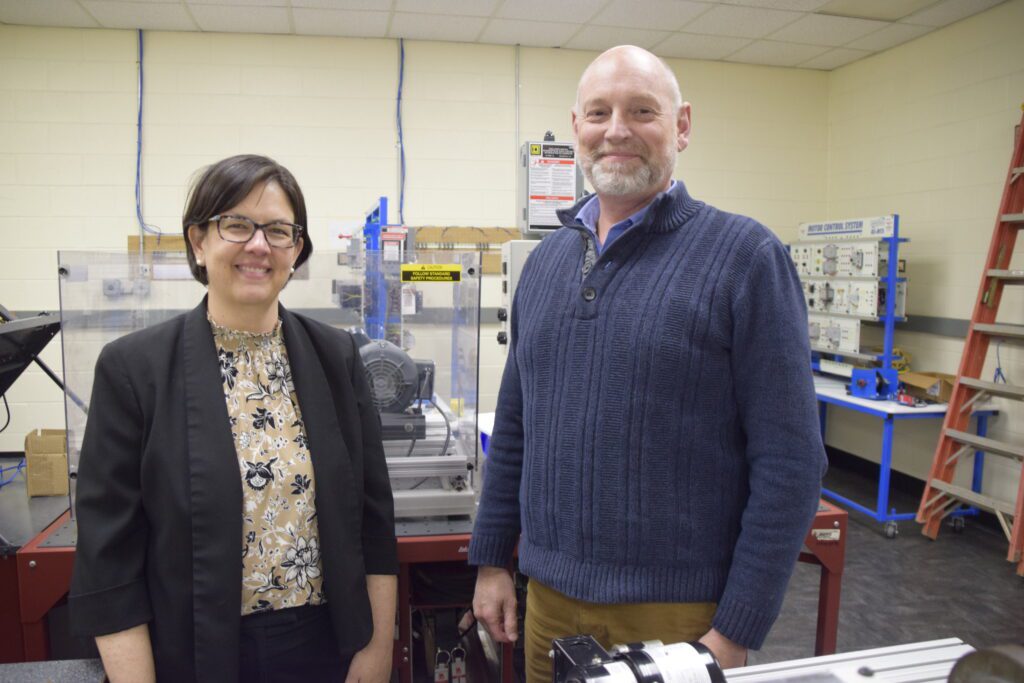

Francis has been in conversation about waste water issues with the mill for two years, and since Jan. 18, he has been on weekly or bi-weekly calls.
“Never. Never anything like this,” he said. “Never suspected it at all.”
He was at an economic development conference in Pinehurst when he heard the news. Francis called the mill manager that night.
“It is like a death,” he said, noting that he had been through the grieving and anger phases. “Now it’s time to get to work.”
First, Francis said, “there are 1,100 people that need to secure their lives again. And then we’ve got to worry about waste water treatment. Then we can worry about the building and the next life of the property.”
He is most worried about the waste water treatment.
When he met with me, he had been going over tax scenarios. The 185 acres of the mill site alone generates $1.3 million in revenue for the town and another $1.3 million for the county annually. That doesn’t include the Waynesville plant, he said.
There is $19 million in the land and buildings, and there is $230 million in personal property, Francis said. Pactiv Evergreen also has a set of contractors on site that generate revenue for the city and county.
Just the leased equipment from other vendors results in $60,000 for the city and the county, he said.
“This is not nickels and dimes we are talking about,” Francis said. “This is big dollars. And we still haven’t gotten the sales tax numbers.”
“Less money,” he said, “just when we have to do more.”
EdNC just released this analysis of child care in the county to assist with planning for the future.
Lessons learned from other mill closings
Back in 2003, Pillowtex Corporation laid off about 4,800 works in Kannapolis. “This was the single largest mass layoff in North Carolina history and presented enormous challenges to the workers, government at all levels and all the affected communities,” according to this case study documenting the work of the rapid response team.
What can the leaders in Canton learn from the case study?
A survey of workers should assess demographics and allow them to opt in to ongoing communication and future reporting of education and employment outcomes.
In the Pillowtex closing, “the greatest immediate need was financial, in particular housing costs, medical costs, health insurance and cost of prescription drugs.”
The experience of the Pillowtex workers allows us to anticipate that it may be hard for workers to confront the reality of the closing, assess options, and conduct job searches. Barriers could include a lack of skills as well as a disinterest in returning to the classroom.
Within five days of the Pillowtex announcement, a community service center was set up in a church. A cross-sector “coordinated services approach” was implemented, including a common assessment application for workers. The Cannon Foundation provided $1 million in philanthropic funding. For more information, see Appendix D of the case study.
The governor’s office offered the following rapid response service for the Pillowtex closing: assistance with job search and placement, including career counseling; payment of tuition and related expenses for training or retraining; on-the-job training opportunities; and additional weeks of unemployment insurance. For more information, see Appendix B of the case study.
The case study finds that “(the) final demise of Pillowtex was drawn out.” A timeline of the Pillowtex closure can be found in Appendix C of the case study.
The 10 additional challenges identified on pages 12-13 of the case study are worthy of review by local and state leaders working in Canton.
Making paper
Paper making is such a big part of this community that it has been taught at Pisgah High School since 2005. There are 26 students in the class I attended, and I am told on good authority from school and district leaders that all of the classes are packed.
That’s in large part because of WC Godfrey, the much beloved teacher.


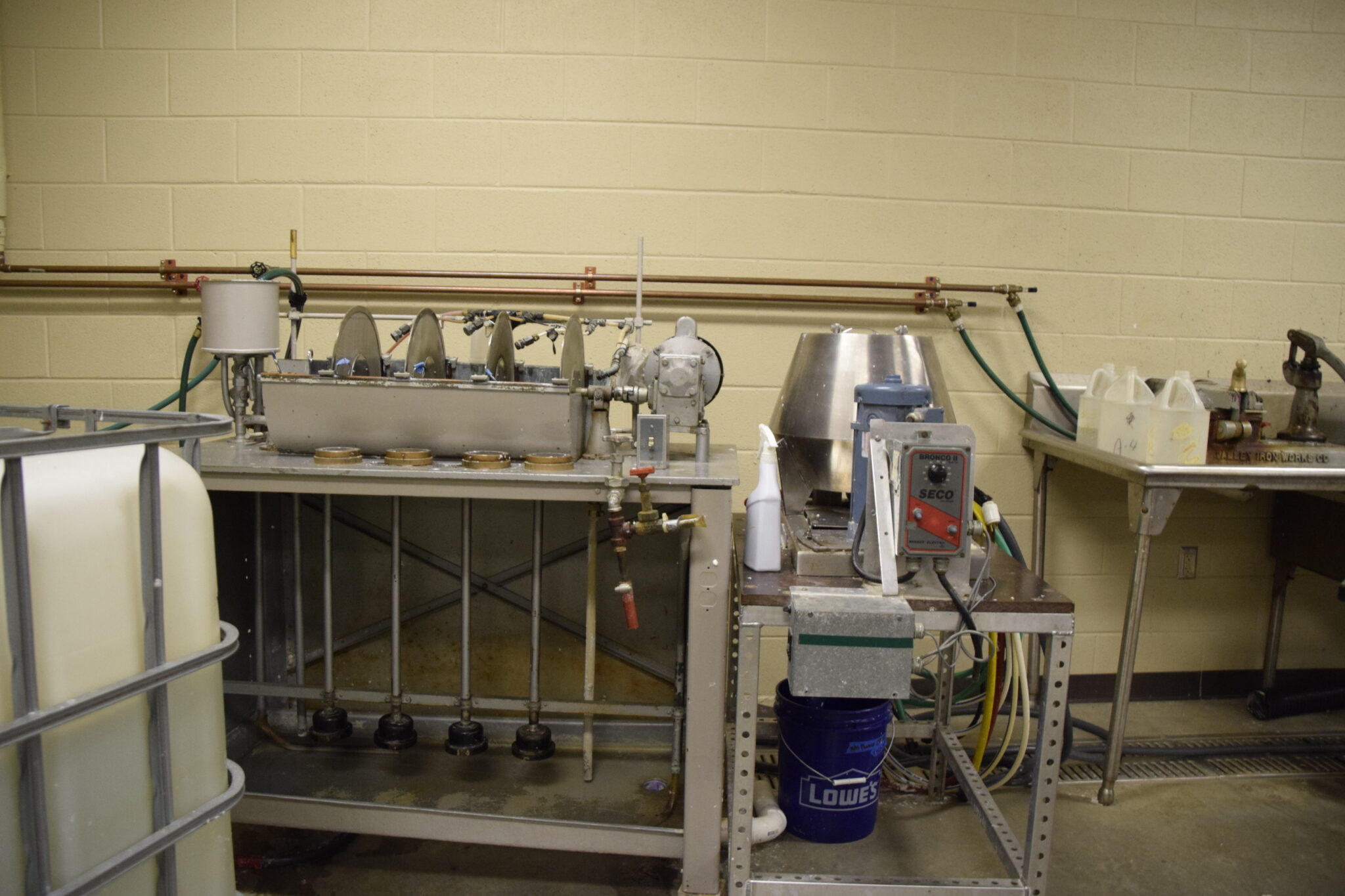



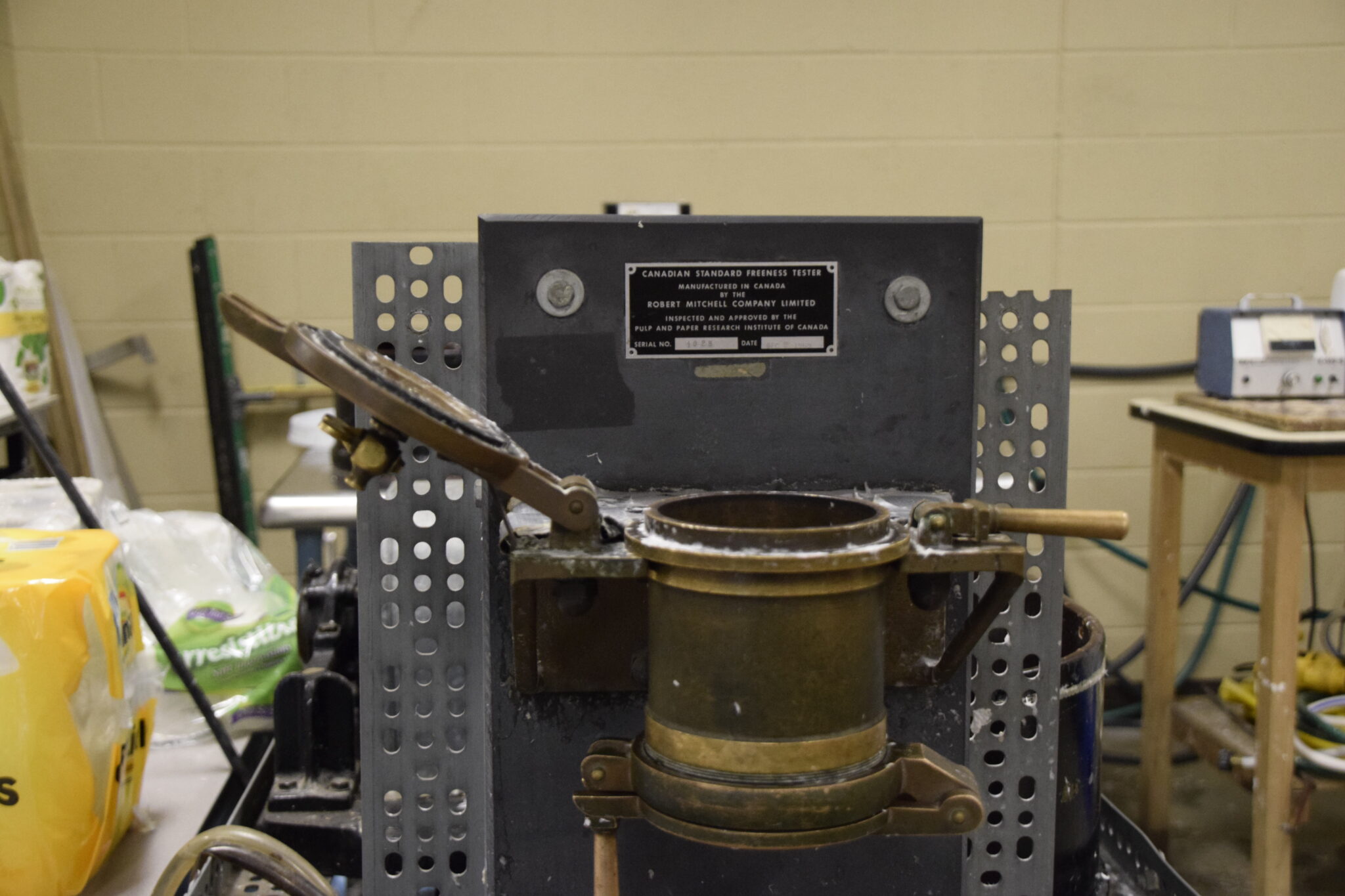



In this time-lapsed video, you can watch a student making a sheet of paper:
A Clemson graduate with a degree in chemical engineering, Godfrey previously worked at the Ecusta paper plant in Brevard, which closed in 2002. He has seen this all before.
Godfrey heard the news of the closing in Canton from a former student. She graduated last June and is now at N.C. State’s paper science and engineering program.
“I know the hurt,” he said. “I felt the hurt as I walked into the mill just now.” Godfrey had taken a group of students to the mill the morning I visited.
Yet he is optimistic for his students. “We are not just teaching paper making. We are teaching a manufacturing process,” he said.
“Find a passion and drive toward it,” Godfrey recommends to his students.


To the community, he said, “this is a turning of the page not just for millworkers.”
EdNC will be in Canton on the last day of operations. We will be there when the whistle stops and the lights go out. We will be there later this summer when an estimated 1,000 out-of-state workers will come to town to dismantle the mill. We will be there in two years when the contract for waste water treatment comes to an end.
We are with you #HaywoodStrong. If you would like to talk to our team when we are in Papertown next, email mrash@ednc.org.






